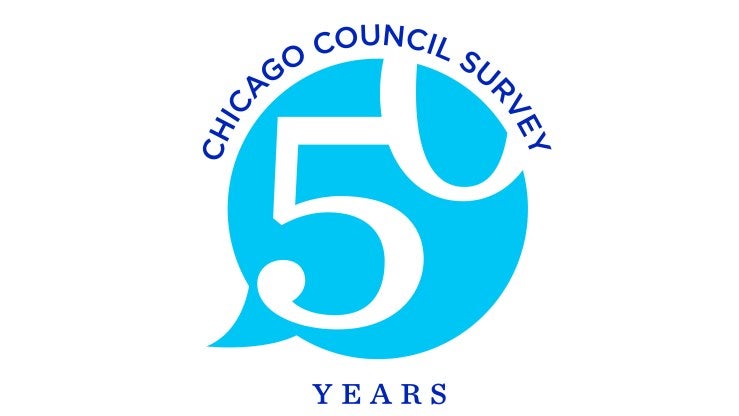Republican views of immigrants and immigration policy largely diverge from overall American attitudes.
The 2024 Chicago Council Survey, conducted June 21–July 1, 2024, finds that Republican concerns over immigration have reached an all-time high in Council polling dating back to 1998. In response, Republicans support a range of policies—including mass deportations and detention camps—that a majority of Americans oppose.
Key Findings
- Eight in 10 Republicans (83%) say large numbers of immigrants and refugees coming into the United States is a critical threat to the country, a record high in Chicago Council Surveys since the Council first asked the question in 1998.
- While a majority of Americans (61%) believe immigrants from other cultures have a mainly positive impact on American society, a majority of Republicans (61%) believe their impact is mainly negative.
- A majority of Americans (65%) oppose the mass detention of undocumented immigrants in camps while a majority of Republicans (57%) support such a policy.
- The majority of Americans (62%) favor a path to citizenship for unauthorized immigrants working in the United States, either with (24%) or without (38%) a fine or waiting period.1
- A plurality of Republicans (44%) say “illegal” immigrants working in the United States should be required to leave their jobs and the country while 41 percent favor providing them a path to US citizenship.
- Half of Republicans (50%) say legal immigration into the United States should be decreased.
Republican Views of Immigrants as a Threat Hits All-Time High
American concern over the large numbers of immigrants and refugees coming into the United States has been on the rise over the last several years. That reflects a dramatic rise in the number of encounters between the US Border Patrol and migrants seeking to enter the United States via the US-Mexico border. The return of mass movements of people from Latin America to the United States—driven in particular by a mass migration of Venezuelans as a result of political and economic turmoil in the country—has brought immigration roaring back as a key political concern for Americans. This spring, Gallup polls found that immigration topped Americans’ list of the most important problems facing the country.
The 2024 Chicago Council Survey finds that half of Americans (50%) say the prospect of large numbers of immigrants and refugees coming into the United States represents a critical threat to the country, making a return to a level of concern not seen in Council polling since 2010. While concerns have grown across partisan groups, including among Democrats and Independents, the rise in Republican perception of immigration as a threat is more dramatic. Eight in 10 Republicans (83%) now view large numbers of immigrants and refugees coming into the United States as a critical threat, a record high in Chicago Council Surveys since the Council first asked the question in 1998.
Republicans Alone Say Immigrants Are Mainly Negative for US Society
One reason for the intense level of concern among Republicans may be their evaluation of how immigrants affect the United States. Six in 10 Americans (61%) say immigrants from other cultures have a mainly positive impact on American society, including eight in 10 Democrats (78%) and 63 percent of Independents—but only 38 percent of Republicans say so. A majority of Republicans (61%) instead say immigrants from other cultures have a mainly negative impact, along with a third of Independents (35%) and two in 10 Democrats (20%).
Republicans More Focused on Immigration as an Issue, Say US Leaders Not Paying Enough Attention
Matching their elevated concern about immigration, Republicans are paying notably more attention to the issue than other Americans. Seven in 10 Republicans (71%) say they are following news about immigration either very (34%) or somewhat closely (37%), compared to more-narrow majorities of Democrats and Independents (53% each). Republicans are also far more likely than other Americans to say immigration will matter a great deal in their deciding whom to vote for in the 2024 presidential election (69%, compared to 41% of Independents and 26% of Democrats–see appendix 1).
Perhaps because Republicans are themselves very focused on the issue, they don’t think US leaders are as focused on immigration as they should be. The vast majority of Republicans (84%) say US leaders are not giving enough attention to immigration, and a majority of Americans overall (59%) and Independents (57%) agree, as do a plurality of Democrats (41%).
Americans Now Think Immigrants Mostly Take Unwanted Jobs
While Americans’ overall perception of mass migration as a threat to the United States has returned to levels last seen in 2010, that doesn’t mean all of the public’s immigration-related views have stayed the same. Indeed, one significant shift in American public opinion on immigration over the past decade has been on what kinds of jobs immigrants living illegally in the United States hold. In 2010, Americans were divided over whether illegal immigrants took jobs from Americans who needed them (49%) or took jobs no one wanted (48%). Today, a majority of Americans say they mostly take jobs nobody wants (69%, 29% take jobs from Americans who need them). Majorities of Democrats (87%) and Independents (70%) agree with this view, as do half of Republicans (48%, 49% take jobs from Americans who need them).
Continued Support for Path to Citizenship for Undocumented Immigrants
One of the most difficult issues about American immigration policy continues to be how to resolve the undocumented status of millions of immigrants living and working in the United States. A majority of Americans (62%) favor allowing “illegal immigrants who are currently working in the United States” to stay and apply for US citizenship, either immediately (38%) or following a waiting period and paying a penalty (24%). An additional 12 percent of Americans favor allowing these immigrants to continue working in the United States but not apply for US citizenship. And a quarter (25%) say these immigrants should be required to leave their jobs and the United States.
As with most immigration issues, Democrats and Republicans are divided on how to handle undocumented immigrants living and working in the United States. Democrats overwhelmingly (82%) favor a path to citizenship for these immigrants, either without preconditions (57%) or following a waiting period and financial penalty (25%). Few Democrats favor an approach based on work permits (8%) or deporting them (8%).
Republicans are more internally divided. A plurality (44%) say illegal immigrants working in the United States should be required to leave their jobs and the country, though a similar proportion support a path to citizenship, either immediately (21%) or after a penalty and waiting period (20%). An additional 15 percent favor allowing them to stay but only on a work permit and without a pathway to US citizenship.
Whether or not immigrants hold jobs in the United States affects public support for letting them become citizens. In a separate question asked of half the survey sample that does not specify if the immigrants in question hold jobs, there is less support for extending a path to citizenship and greater support for requiring them to leave the country.
Public Opposes—but Narrow Majority of Republicans Support—Mass Detention Camps for Undocumented Immigrants
Mass deportations of immigrants living illegally in the United States is a key policy pledge of the Donald Trump campaign and the 2024 Republican Party platform. As part of that effort, undocumented immigrants would be rounded up into camps prior to legal hearings and deportations. This is not a popular policy. When asked if the United States should detain millions of undocumented immigrants in mass detention camps while they await immigration hearings, a majority of Americans (65%), along with eight in 10 Democrats (80%) and two-thirds of Independents (68%) oppose doing so. By contrast, a majority of Republicans (57%) favor detaining millions of undocumented immigrants in camps (41% oppose).
Majority of Americans Favor Expanding US-Mexico Border Wall
While most Americans oppose setting up detention camps, a majority of Americans (55%) favor another Trump-era project: expanding the 700 miles of border wall and fencing with Mexico in order to reduce illegal immigration into the United States. This includes nine in 10 Republicans (89%) and half of Independents (53%), while only one in four Democrats says the same (26%). Support for the wall is up 14 percentage points from 2019, when a minority of 41 percent favored its expansion.
Republicans Support—and Democrats Oppose—Using US Military to Stop Migration
In addition to being more likely to support deporting undocumented immigrants from the United States, Republicans are far more likely to support using the US military to prevent additional unauthorized migration. A large majority of Republicans (84%) favor using US troops to stop immigrants from coming into the United States from Mexico. Independents are divided (50% favor, 48% oppose) while Democrats are more firmly opposed (68%, 30% support). Yet matching the growing concern about migration across the southern US border, support for using the US military in this way has risen across partisan groups over the past year by five to seven percentage points, depending on the group.
Plurality Favor Maintaining Current Legal Immigration Levels
While the bulk of the political attention is on the problem of unauthorized immigration into the United States, the question of legal immigration remains a critical piece of the policy puzzle. Today a plurality of Americans (44%) say legal immigration to the United States should be kept at its present level. A third (33%) favor decreasing legal immigration, while two in 10 (22%) favor increasing legal immigration levels. Since 2020, support for decreasing legal immigration has grown slightly, while support for increasing legal immigration has fallen by a similar proportion.
As is true for most immigration issues, Republicans and Democrats disagree on appropriate levels of legal immigration. Half of Republicans (50%) favor decreasing legal immigration, along with three in 10 Independents (31%) and two in 10 Democrats (22%). A plurality of Democrats would prefer to keep legal immigration at present levels (47%), as would a plurality of Independents (45%) and 38 percent of Republicans. And three in 10 Democrats (30%) would prefer to see legal immigration to the United States increase, as would a quarter of Independents (23%) and one in 10 Republicans (11%).
While Republican views have been fairly consistent over the past two decades, Democratic support for increased legal immigration has varied considerably since 2016 (see appendix 1 for more details). Between 2016 and 2020, Democratic support for greater legal immigration rose 19 percentage points (from 24% to 43%). Yet over the past four years, support for greater legal immigration has declined steadily year-over-year, falling 13 points to the present 30 percent.
Conclusion
For years, Council polling has found that Republicans and Democrats hold different views on immigration policy. Heading into the 2024 presidential election, those gaps remain vast.
As Republican concerns have risen to new heights, they have also pulled Republican viewpoints away from more-mainstream American views. To put it simply: a majority of Republicans think immigrants are bad for the country, view large numbers of them coming into the country as a threat, and want to put undocumented immigrants in camps so they can be deported. By contrast, a majority of Americans believe immigrants are good for the country, oppose the mass detention and deportation of undocumented immigrants, and want to offer these immigrants a pathway to gaining US citizenship.
To be clear, there is also concern about unauthorized immigration among the broader public. A majority of Americans favor expanding the US-Mexico border wall and fencing, just over half favor using US troops to stop immigrants from coming into the country over the US-Mexico border, and half view the mass movement of immigrants and refugees into the country as a critical threat. In particular, Democrats have grown less accepting of legal immigration over the past four years. But Republicans’ preferences for how to deal with these problems of migration are out of step with most Americans’ views on the issue.
- 1
In order to compare recent results to those spanning several decades, the survey uses the language “illegal immigrants” in several questions. In past work, we tested describing unauthorized immigrants as “illegal” versus “undocumented” and found that changing the wording affects respondents’ attitudes on immigration policy. We kept the original wording this year to track changes since the first time we asked the question in 1998.
This analysis is based on data from the 2024 Chicago Council Survey of the American public on foreign policy, a project of the Lester Crown Center on US Foreign Policy. The 2024 Chicago Council Survey was conducted June 21–July 1, 2024, by Ipsos using its large-scale nationwide online research panel, KnowledgePanel, in English and Spanish among a weighted national sample of 2,106 adults 18 or older living in all 50 US states and the District of Columbia. The margin of sampling error for the full sample is ±2.3 percentage points, including a design effect of 1.1229. The margin of error is higher for partisan subgroups (±4.2 points for Republicans, ±3.9 points for Democrats, and ±3.8 points for Independents.) or for partial-sample items.
Partisan identification is based on how respondents answered a standard partisan self-identification question: “Generally speaking, do you think of yourself as a Republican, a Democrat, an Independent, or what?”
The 2024 Chicago Council Survey is made possible by the generous support of the Crown family, the Korea Foundation, and the United States-Japan Foundation.
Q405C. Do you think illegal immigrants mostly take jobs that nobody wants or do they mostly take jobs away from Americans who need them?
| Overall | Republican | Democrat | Independent | R-D Gap | |
|---|---|---|---|---|---|
| Mostly take jobs that nobody wants | 69 | 48 | 87 | 70 | -39 |
| Mostly take jobs from Americans who need them | 29 | 49 | 12 | 28 | 37 |
Q405D. Do you think immigrants living illegally in the United States mostly take jobs that nobody wants or do they mostly take jobs away from Americans who need them?
| Overall | Republican | Democrat | Independent | R-D Gap | |
|---|---|---|---|---|---|
| Mostly take jobs that nobody wants | 71 | 52 | 88 | 71 | -36 |
| Mostly take jobs from Americans who need them | 27 | 47 | 10 | 27 | 37 |



Related Content
 Public Opinion
Public Opinion
Of the eight policies included in a Council-Ipsos survey, not one is supported by a majority of both parties.
 US Foreign Policy
US Foreign Policy
Republicans with very favorable views of Trump are more likely than other GOP backers to support deportations for undocumented immigrants.
 Public Opinion
Public Opinion
Cleavages within the party could further complicate President Joe Biden's path to reelection.


